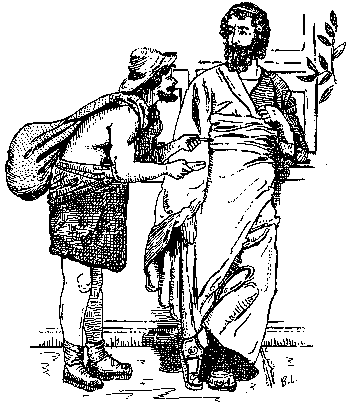
REAL HISTORY
A Man of Honour
In the days of Ancient Greece there lived a man called Aristides. He was one of the foremost men in Athens, and commanded its army in war, as well as controlling its government in peace; however, because he was scrupulously honest he remained poor, in spite of the wealth that passed through his hands. Gradually his reputation as a just and honest man spread amongst the people, and he became known as “Aristides the Just”.
|
|
Unfortunately, there were those who felt jealous of Aristides’s popularity, in particular the men who had a hand in the governing of Athens. They wished to get whatever they could for themselves, and so long as Aristides was powerful, they were prevented from appropriating taxes, accepting bribes, making unfair judgements, etc. The most dangerous of these enemies was a man called Themistocles, who had been a boyhood friend of Aristides. He spread rumours against him, and persuaded the people that it would be wise to send him into exile, for (so Themistocles claimed) he had grown too powerful, and desired to make himself supreme ruler. The Athenians were quick to believe this report, and it was decided that they would hold a vote of “ostracism”. This could take place whenever the rivalry between two leaders became so great as to endanger the state; citizens wrote the name of whichever man they wished to see exiled on a piece of broken pottery (called in Greek an “ostrakon”), and the leader with the most votes against him was forced to leave Athens for ten years.
In this case the two leaders were Themistocles and Aristides. On the day of
the vote the people assembled in the market place, and began to write one or
other of the two names on the pieces of pottery.
A peasant who could not write walked up to Aristides, who was
looking on, and asked him to mark the name “Aristides” on his ostrakon.
Aristides looked at the man in surprise.
“Why,” he said. “Has Aristides done you any harm?”
“Nay,” answered the peasant, who had no idea who he was talking to. “Nor
do I know the fellow – I am merely tired of always hearing him called “the
Just”.
Without a word Aristides wrote his own name on the piece of pottery, and
handed it back to the man.
Although he was sent into exile, Aristides was soon recalled, and the noble
spirit so remarkable in this story, ensured that he regained his old popularity,
and passed unscathed through the temptations and pitfalls of government.
He died poor but content, and was remembered with great respect by the
Athenians and the other inhabitants of Greece.